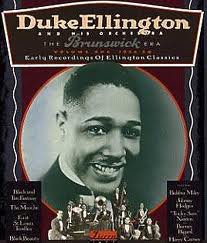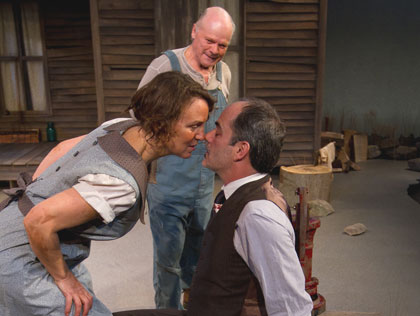 Early on Saturday evening I finished editing the 16,000-word, seventy-one-page first draft of the fourth chapter of my Duke Ellington biography. (To give you some perspective on this piece of work, my Wall Street Journal drama columns are about 850 words long.) This section of the book takes Ellington from the fall of 1926, when he made his first electrical recordings and signed a management contract with Irving Mills, to the summer of 1929, when he made his Broadway debut.
Early on Saturday evening I finished editing the 16,000-word, seventy-one-page first draft of the fourth chapter of my Duke Ellington biography. (To give you some perspective on this piece of work, my Wall Street Journal drama columns are about 850 words long.) This section of the book takes Ellington from the fall of 1926, when he made his first electrical recordings and signed a management contract with Irving Mills, to the summer of 1929, when he made his Broadway debut.
It was a long, backbreakingly complicated chapter to write, not merely because it deals with one of the most eventful and consequential periods of Ellington’s life, but because I also had to write concise character sketches of Mills and seven key players in the Ellington band who were hired during this time: Barney Bigard, Wellman Braud, Harry Carney, Johnny Hodges, Freddie Jenkins, Tricky Sam Nanton, and Cootie Williams. In addition, I had to describe the Cotton Club, where Ellington’s band made its debut at the end of 1927, and write extended discussions of three important Ellington recordings, “East St. Louis Toodle-Oo,” “Black and Tan Fantasy,” and “Creole Love Call.”
 To pack so much material into the span of a single chapter is an alarmingly difficult conceptual feat. To do it without having the results seem dry and fact-crammed is more difficult still. In order to avoid the latter fate, I devoted a couple of pages to a description of what America was like in 1927, and I confess to liking the results:
To pack so much material into the span of a single chapter is an alarmingly difficult conceptual feat. To do it without having the results seem dry and fact-crammed is more difficult still. In order to avoid the latter fate, I devoted a couple of pages to a description of what America was like in 1927, and I confess to liking the results:
Nineteen twenty-seven was a rich year for American culture. It was the year of Show Boat, The General, Elmer Gantry, Irving Berlin’s “Blue Skies,” Aaron Copland’s jazz-flavored Piano Concerto, Stuart Davis’ equally jazzy “Egg Beater No. 1,” and the last volume of H.L. Mencken’s Prejudices. Charles Lindbergh had flown from New York to Paris in May, and Sacco and Vanzetti were executed in August. For those who knew how to make it, there was money to burn: Babe Ruth earned $70,000 playing for the Yankees, the equivalent of $857,000 today. (A laborer at Fisher Body’s assembly plant in Flint, Michigan, made $1,783.) You could buy a loaf of bread for nine cents, a copy of Time for fifteen cents, a raccoon coat for $40, an Atwater Kent radio for $70, or a Model T for $290. Radio was big, but the phonograph was bigger: one hundred million records were sold in America, and among them were Louis Armstrong’s “Potato Head Blues” and Bix Beiderbecke’s “Singin’ the Blues.”
The entertainment listings in the “Goings On About Town” section of the December 3 issue of The New Yorker read like a magic carpet ride. On Broadway Katharine Cornell was starring in Somerset Maugham’s The Letter, Alfred Lunt and Lynn Fontanne in George Bernard Shaw’s The Doctor’s Dilemma, and Fred and Adele Astaire in George and Ira Gershwin’s Funny Face. If you felt like taking in a movie, you could check out The Jazz Singer, which had opened in October and was still going strong, though the magazine’s anonymous critic gave it a mixed notice: “Al Jolson superb in the Vitaphone which accompanies this dull movie.” Alfred Stieglitz was showing works by John Marin, America’s first cubist painter, at Room 303, the photographer’s modernism-friendly art gallery. Among the books reviewed in the magazine that week was Thornton Wilder’s The Bridge of San Luis Rey, and the list of recommended new titles for Christmas shoppers included Willa Cather’s Death Comes for the Archbishop, Ernest Hemingway’s Men Without Women, and P.G. Wodehouse’s Carry On, Jeeves.
“Goings On About Town,” however, had not yet discovered the Cotton Club. The only Harlem nightspots mentioned in the December 3 issue, and for many more issues to come, were Barron’s Exclusive Club, Small’s Paradise, and Club Ebony. “The later the better, and do not dress,” the magazine advised readers interested in visiting Harlem. A week later Lois Long, the wife of society cartoonist Peter Arno and the cabaret correspondent of The New Yorker, whose “Tables for Two” column she wrote under the fey pseudonym of “Lipstick,” announced that “I am mad at Harlem. It is getting too refined. All the Harlemites are getting a little ashamed of the Black Bottom, that quaint old native dance handed down by levee-working grandfathers…Give me a Holy Rollers meeting any time. Or Small’s. Or, possibly, the Ebony.”
The New Yorker had only just started to cover “Popular Records” in 1927, and the reviewer who wrote about them seemed not to have heard any black musicians. (He favored Ben Bernie and the Clicquot Club Eskimos.) Indeed, one could read The New Yorker for month after month without running across a single hint that black people of any kind existed, though a couple of weeks later a poetess named Frances Park opined on “Harlem 1927”: A slim brown girl/With a heart of flame/Will never admit/She feels it shame/To be dark of skin/With ink-black hair,/Nor wish she were/As the white folk there. But “Lipstick,” unlike her colleagues, knew her way around certain parts of Harlem, and she also knew that certain of its nightspots were friendlier than others to visitors from downtown. In due course “Goings On About Town” started advising its readers to stick to Connie’s Inn and Small’s unless you have “a friend who’ll personally conduct you.” A week later, the advice was more candid: “Better find a friend who knows his way about; the liveliest places don’t welcome unknown whites.”
That part was fun to write, though it was also damned hard work.
If I had to guess, I’d say that I’ve now written between a fourth and a third of the book, not counting source notes. My schedule for the next couple of weeks is awfully hectic, so I doubt that I’ll be plunging straight into the next chapter. But I’m far ahead of schedule, and I mean to stay that way.
By the way, I also saw two shows, wrote two drama columns, paid a visit to an artists’ colony, made several fixes to the libretto for Danse Russe, and turned fifty-five last week. I did, however, take yesterday off!
* * *
The Ellington band plays “Old Man Blues” in Check and Double Check, filmed in 1930. The trumpet soloist is Freddie Jenkins:

 “A Moon for the Misbegotten” suffers from both of these problems, and by all rights they ought to kill it stone dead. Not only does the play open with an hour and a half of wholly unnecessary exposition, but there’s not a quotable line in it–not even in the second half, which is when O’Neill finally steps on the gas pedal and gets moving. But what started out as a stage-Irish yukfest then turns into a deeply compassionate study of a drunken ex-actor (Eric Hissom) and a poor, unattractive farm girl (Grace Gonglewski) who are too proud to let themselves love one another, and almost before you know it you find yourself caught up in their plight.
“A Moon for the Misbegotten” suffers from both of these problems, and by all rights they ought to kill it stone dead. Not only does the play open with an hour and a half of wholly unnecessary exposition, but there’s not a quotable line in it–not even in the second half, which is when O’Neill finally steps on the gas pedal and gets moving. But what started out as a stage-Irish yukfest then turns into a deeply compassionate study of a drunken ex-actor (Eric Hissom) and a poor, unattractive farm girl (Grace Gonglewski) who are too proud to let themselves love one another, and almost before you know it you find yourself caught up in their plight.